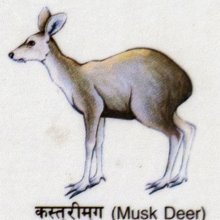Kasturimriga, Kastūrīmṛga, Kasturi-mriga: 6 definitions
Introduction:
Kasturimriga means something in Hinduism, Sanskrit, Marathi. If you want to know the exact meaning, history, etymology or English translation of this term then check out the descriptions on this page. Add your comment or reference to a book if you want to contribute to this summary article.
The Sanskrit term Kastūrīmṛga can be transliterated into English as Kasturimrga or Kasturimriga, using the IAST transliteration scheme (?).
Images (photo gallery)
In Hinduism
Ayurveda (science of life)
Veterinary Medicine (The study and treatment of Animals)
Source: Shodhganga: Portrayal of Animal Kingdom (Tiryaks) in Epics An Analytical studyKastūrimṛga (कस्तूरिमृग) refers to the Musk deer (Moschus Moschiferus), according to scientific texts such as the Mṛgapakṣiśāstra (Mriga-pakshi-shastra) or “the ancient Indian science of animals and birds” by Hamsadeva, containing the varieties and descriptions of the animals and birds seen in the Sanskrit Epics such as the Ramayana and Mahabharata.

Āyurveda (आयुर्वेद, ayurveda) is a branch of Indian science dealing with medicine, herbalism, taxology, anatomy, surgery, alchemy and related topics. Traditional practice of Āyurveda in ancient India dates back to at least the first millenium BC. Literature is commonly written in Sanskrit using various poetic metres.
Languages of India and abroad
Marathi-English dictionary
Source: DDSA: The Molesworth Marathi and English Dictionarykastūrīmṛga (कस्तूरीमृग).—m (S) The musk-deer, Moschus moschiferus.
Marathi is an Indo-European language having over 70 million native speakers people in (predominantly) Maharashtra India. Marathi, like many other Indo-Aryan languages, evolved from early forms of Prakrit, which itself is a subset of Sanskrit, one of the most ancient languages of the world.
Sanskrit dictionary
Source: DDSA: The practical Sanskrit-English dictionaryKastūrīmṛga (कस्तूरीमृग).—the musk-deer.
Derivable forms: kastūrīmṛgaḥ (कस्तूरीमृगः).
Kastūrīmṛga is a Sanskrit compound consisting of the terms kastūrī and mṛga (मृग). See also (synonyms): kasturikākuraṅga, kastūrīkuraṅga, kasturikāmṛga.
Source: Cologne Digital Sanskrit Dictionaries: Monier-Williams Sanskrit-English DictionaryKastūrīmṛga (कस्तूरीमृग):—[=kastūrī-mṛga] [from kastūrī > kastūrikā] m. the musk-deer [commentator or commentary] on [Kumāra-sambhava i, 55.]
[Sanskrit to German]
Sanskrit, also spelled संस्कृतम् (saṃskṛtam), is an ancient language of India commonly seen as the grandmother of the Indo-European language family (even English!). Closely allied with Prakrit and Pali, Sanskrit is more exhaustive in both grammar and terms and has the most extensive collection of literature in the world, greatly surpassing its sister-languages Greek and Latin.
Kannada-English dictionary
Source: Alar: Kannada-English corpusKastūrimṛga (ಕಸ್ತೂರಿಮೃಗ):—
1) [noun] a small, hornless deer (Moschus moschiferus) of the uplands of central Asia, the male of which secretes musk and has tusklike upper canines; musk deer.
2) [noun] any of several nocturnal, catlike carnivores (family Viverridae) of India, with spotted, yellowish fur, valued for its civet; civet cat.
Kannada is a Dravidian language (as opposed to the Indo-European language family) mainly spoken in the southwestern region of India.
See also (Relevant definitions)
Partial matches: Mriga, Kasturi.
Full-text: Kasturi, Samsparshin, Kasturikuranga, Kasturikakuranga, Kasturikamriga, Kasturika, Samcara.
Relevant text
Search found 1 books and stories containing Kasturimriga, Kastūrīmṛga, Kasturimrga, Kasturi-mriga, Kastūrī-mṛga, Kasturi-mrga, Kastūrimṛga, Kastūri-mṛga; (plurals include: Kasturimrigas, Kastūrīmṛgas, Kasturimrgas, mrigas, mṛgas, mrgas, Kastūrimṛgas). You can also click to the full overview containing English textual excerpts. Below are direct links for the most relevant articles:
